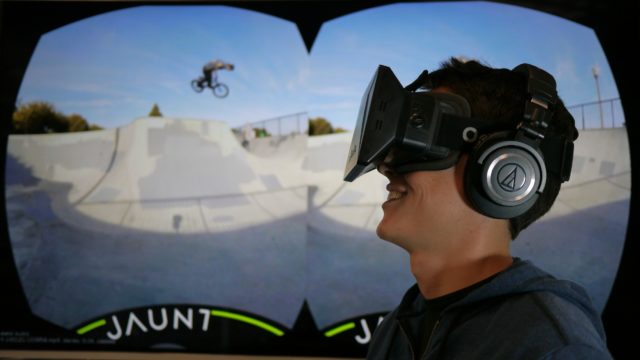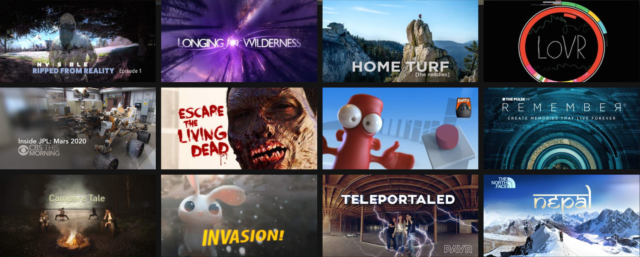Nearly one year after The Walt Disney Company led a $66 million investment round in Jaunt, the entertainment conglomerate is further supporting the virtual reality startup through its Accelerator program, which was announced last month at the Disney Studios in Burbank, California.
The Palo Alto-based movie studio that provides end-to-end solutions and produces short cinematic VR pieces is going behind the scenes this season to film ESPN’s College GameDay stops in VR—tailgates, interviews, sideline action, the signs, et al. They also have licensed Disney Research’s VR video technology and will be collaborating with Disney Research to integrate it into Jaunt’s Cloud Services.

“We’re looking to bring commitment to new ideas and new people and technological innovation to our company, and to help them get off the ground by giving them an environment and the kind of support startup companies often need to succeed,” said Disney CEO Bob Iger. “Obviously, there is great mutual benefit for all of us. We are in businesses that are unbelievably dynamic and always changing.”
“We’re happy to discover Jaunt, which creates VR experiences that are so much like being there that ESPN and Disney took notice, took an interest, and got excited,” added ESPN president John Skipper.
George Kliavkoff, who in September was appointed CEO for Jaunt, told [a]listdaily that they’ll be collaborating with every single division of Disney in order to make VR become the next big thing in video.
“For us it’s great because Disney has terrific IPs, and we can match it with our great technology and storytelling together. I honestly can’t think of a premium content partner that we want to work with,” said Kliavkoff.
With its sights fully set on bringing fans closer to the game and capitalizing on cinematic storytelling, and letting them be their own director, of sorts, ESPN and Jaunt produced a four-minute, 360-degree piece of the Oct. 1 matchup between Clemson and Louisville, immersing viewers inside and outside of Memorial Stadium. Throughout the rest of the season, Jaunt and ESPN crews will be working together to film in VR at the College GameDay stops.
“At our core, we’re a media company with the force of Silicon Valley technology and innovation behind it. What we have what no one else does is the end-to-end solution. We have the best camera technology and software. Most importantly, though, we have great storytellers in our studio,” Kliavkoff said. “The key component of what we’re doing with College GameDay is that we’re actual putting the fan there, and spending the weekend on campus doing everything they would be doing if they were there—including going to the GameDay set, watching the cheerleaders and the game, and enjoying the celebration after the game. There are some stories that are just better told as if you were there rather than staring at a flat screen.”
Jaunt, who has raised more than $100 million to date and launched a joint venture to create Jaunt China in May, will also be producing a consumer VR tour of Shanghai Disneyland.
Jaunt founder Arthur van Hoff is particularly excited about the venture in Asia, telling [a]listdaily, “China is a huge market that is excited about VR. We are already on the ground there and producing content for the Chinese market. Some of that content will be coming to the US as well and that’s a huge differentiator and an unfair advantage that we have. The goal for us is to take people to places they cannot go to. That’s a huge opportunity.”
Disney has been running its Accelerator program for the past three years. The most successful one was Sphero, creators of the BB-8 gyroscopic toy to tie into Star Wars: The Force Awakens. Sphero CEO Paul Berberian said the toy sold out worldwide within one hour last holiday season.

With all of the major VR headsets currently available on the market, what will it take for the platform to steal the show this holiday season with consumers? According to van Hoff, it needs promotion.
“VR by itself is relatively new,” he says. “Next year is all going to be about adoption, and by next Christmas, there will be even better devices. On top of that, the phone that you are going to buy next year is going to be VR ready. That is a huge opportunity for us, because mobile is the entry point. The devices are here now. People are going to buy them and have the experiences and they going to learn about it. VR is still really limited to the early adopters. We need to get past that.”
Jaunt, which has 80 percent of their traffic come from mobile, is also paying attention to flat-screen viewers who can’t afford VR hardware with Compass, which leverages the aggregate of positional data available from VR headset viewing to bring web viewers an auto guided experience based on established points of interest. It’s already been implemented for their “Escape the Living Dead,” “Home Turf: The Needles,” “INVASION! Sneak Peek,” and “Zoolander Infinity.”
Kliavkoff and company are anxiously waiting for the VR tide to roll in and hit a new crescendo.
“The great part is that all of the platforms that everyone is already spending a tremendous amount of time on—YouTube, Facebook—they’re already very heavily invested in VR and they see it as the next computing platform,” he says. “So we’re going to ride that wave with Disney.”
Follow Manouk Akopyan on Twitter @Manouk_Akopyan

